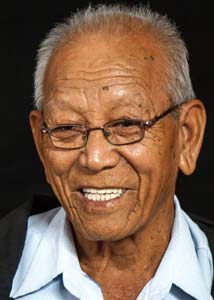Name: Dawa Dakpa
(Alias: No)
Gender: Male
Interview Age: 80
Date of Birth: 1933
Birthplace: Phenpo, Utsang, Tibet
Year Left Tibet: 1959
Profession: Monk
Monk/Nun: Previously
Political Prisoner: No

Interview No.: 27B
Date: 2014-01-02
Language: Tibetan
Location: Lugsung Samdupling Settlement, Bylakuppe, Karnataka, India
Categories: Resistance and Revolution
Keywords: childhood memories, children's games, Chushi Gangdrug guerrillas, Dalai Lama, escape experiences, government/administration, March 10th Uprising, monastic life, Norbulingka -- defense of, resistance fighters, Utsang
Summary:
Dawa Dakpa's family were samadok 'farmers and herders.' He recalls herding animals as a child and played a game called apchu with ankle bones of sheep. He was sent to join Sera Monastery at the age of 11. Dawa Dakpa learned to play the dhung 'longhorn' and gyaling 'clarinet,' and gives a demonstration. He speaks about the selection of such players and the training required.
Dawa Dakpa was in Lhasa during the March 10th Uprising of 1959, when tens of thousands gathered to prevent the Dalai Lama from going to the Chinese Headquarters. He describes the general public's antagonistic feelings towards the Tibetan Government officials and the stoning to death of an official believed to be a Chinese collaborator. Dawa Dakpa was admitted with many other monks into Norbulingka as volunteer guards.
Dawa Dakpa was determined to sacrifice his life to protect His Holiness the Dalai Lama from the Chinese. The volunteer guards felt useless without weapons and demanded that the Tibetan Government provide them with arms. Dawa Dakpa witnessed the Chinese' shelling of the Norbulingka and the Potala Palace, and the depressing scene of dead bodies after the attack. He and the other monks were greatly relieved to hear that the Dalai Lama had already safely escaped to India. There was no reason to remain and they also fled from Lhasa.
Interview Team:
- Marcella Adamski (Interviewer)
- Tenzin Yangchen (Interpreter)
- Pema Tashi (Videographer)

